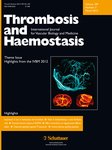
Oral dabigatran as effective as enoxaparin in preventing thromboprophylaxis after THA

Oral dabigatran as effective as enoxaparin in preventing thromboprophylaxis after THA
Oral dabigatran versus enoxaparin for thromboprophylaxis after primary total hip arthroplasty (RE-NOVATE II*). A randomised, double-blind, non-inferiority trial
Thromb Haemost. 2011 Apr;105(4):721-9. doi: 10.1160/TH10-10-0679. Epub 2011 Jan 12Did you know you're eligible to earn 0.5 CME credits for reading this report? Click Here
Synopsis
2055 patients undergoing total hip arthroplasty (THA) were randomized to receive oral dabigatran or subcutaneous enoxaparin to compare the impact each pharmaceutical had on the incidence of venous thromboembolism (VTE) and all-cause mortality. Following assessments over a 3 month period, the results displayed that both dabigatran and enoxaparin were equally effective in preventing VTE following TH...
To view the full content, login to your account,
or start your 30-day FREE Trial today.
FREE TRIAL
LOGIN
Forgot Password?
Explore some of our unlocked ACE Reports below!

Learn about our AI Driven
High Impact Search Feature
Our AI driven High Impact metric calculates the impact an article will have by considering both the publishing journal and the content of the article itself. Built using the latest advances in natural language processing, OE High Impact predicts an article’s future number of citations better than impact factor alone.
Continue



 LOGIN
LOGIN

Join the Conversation
Please Login or Join to leave comments.